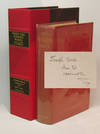
Daniel Webster Promotes Nationalism Over Just Sectionalism After Compromise of 1850: He accurately worries that pro-Whig activists of both north and south risk destroying the Whig Party.
- Used
- Signed
- Condition
- See description
- Seller
-
Ardmore, Pennsylvania, United States
Payment Methods Accepted
About This Item
""There have been those who desire to uphold all sorts of local ideas, prejudices, and animosities, by the general strength of the Whig cause. If we cannot free ourselves from these counsels, the Whig Party must inevitably cease to be the great, strong, and conservative party of the country.""
The new Federal territories obtained from Mexico in 1848, and whether they were to permit slavery, brought the nation again to a crisis. The subject had immediacy because with the huge number of people (the 49ers) who were flooding into California seeking gold, that territory was already seeking statehood. Feeling that slavery was inappropriate for the western territories, the President, southerner Zachary Taylor, supported organizing all the former Mexican lands into the territories of California and New Mexico and bringing them into the Union immediately as free states. Some southerners felt betrayed and threatened to secede, while men in Congress worked on a series of compromise measures, trying to find an amicable settlement. In January 1850, Henry Clay introduced the Compromise of 1850. This consisted of a number of provisions, the chief two providing for California to be admitted as a free state and another making it a crime for northerners to help fugitive slaves who were trying to escape slavery. In the North, few could stomach this stricter fugitive slave act. It would become—until prohibition—the most flagrantly disobeyed legislation ever passed by Congress.
Webster, who had served in the Senate for decades and knew southerners well, believed that a compromise was necessary to preserve the Union. He addressed the Senate on March 7, 1850, urging support for the package of bills. ""Mr. President,"" he said, ""I wish to speak today, not as a Massachusetts man, nor as a Northern man, but an American and a Member of the Senate of the United States…I speak today for the preservation of the Union. Hear me for my cause."" In pleading the Union's cause, Webster said the Senate's main concern was neither to promote slavery nor to abolish it, but to preserve the United States of America. This speech met with general disfavor throughout the North and destroyed both his popularity and his dream of becoming president. Carl Schurz describes the antislavery men as contemplating “the fall of an archangel.” Webster was called “a recreant son of Massachusetts,” “a fallen star,” and “a bankrupt politician gambling for the presidency.” Others worried about the impact of the speech and Webster’s stance on the Whig Party.
John K. Porter, a New York attorney involved in Whig politics, was just such a person. The eloquent Porter had delivered a speech at the Whigs’ National Convention in Baltimore of 1844. Amidst a legal career spanning close to half a century, he served as judge of the New York State Court of Appeals. Porter is best remembered as one of the prosecutors of Charles J. Guiteau, the man who assassinated President James Garfield in 1881, and as one of the defense team of Henry Ward Beecher during his scandalous trial.
Autograph Letter Signed in the wake of his speech, 2 pages, Washington, May 14, 1850, to Porter, promoting nationalism over sectionalism, and implying that activists of both north and south, trying to pull the Whig Party in one direction or the other, risked destroying it altogether. “I concur with you most heartily, in all you say, of the interest & the duty of the Whig Party at the present. We have been in great danger of dissolving into various isms, or peculiarities, not essentially part of any sound Whig creed. There have been those who desire to uphold all sorts of local ideas, prejudices, and animosities, by the general strength of the Whig cause. If we cannot free ourselves from these counsels, the Whig Party must inevitably cease to be the great, strong, and conservative party of the country.”
John F. Kennedy believed Webster’s disregard of personal consequences for the good of the country to be a profile in courage. Perhaps so, but his position and those of the other pro-Compromise Whigs caused most of their northern adherents to flee the party (which would soon cease to exist) and form a new one - the Republicans.
Reviews
(Log in or Create an Account first!)
Details
- Bookseller
- The Raab Collection
(US)
- Bookseller's Inventory #
- 5835
- Title
- Daniel Webster Promotes Nationalism Over Just Sectionalism After Compromise of 1850
- Book Condition
- Used
- Date Published
- 14/05/1850
Terms of Sale
The Raab Collection
10 day return guarantee, with full refund excluding shipping costs for up to 10 days after delivery if an item is returned in original condition
About the Seller
The Raab Collection
About The Raab Collection
Glossary
Some terminology that may be used in this description includes:
- New
- A new book is a book previously not circulated to a buyer. Although a new book is typically free of any faults or defects, "new"...
